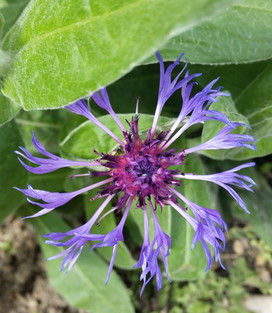Cold Weather and Fritillaries
- Clare
- Apr 7, 2021
- 3 min read
Where has the sun gone? As I am writing this, snow is falling outside the window and there is a real chill in the air. It is such a contrast to the sunshine earlier this week, when the brightness was set at a level that seemed to give the forsythia a golden halo and the shadows created around the borders contrasted the colour of each plant perfectly.
Time is certainly ticking by and new flowers are appearing daily. Catkins are dancing amongst the branches of the birch trees, the flowering currant is a mass of pink and the forget-me-nots are carpeting the borders in blue. The tulips and perennial cornflower (Centaurea montana) have started to flower and my little Magnolia stellata is looking beautiful.

"The magnolia tree, named after the French botanist Pierre Magnol, is an ancient tree that evolved before the bees, and it developed in such as way as to encourage its pollination by beetles". Taken from The Curious Gardener's Almanac by Niall Edworthy
As the flowers emerge, they bring more insects and birds back to the garden. The laurel is currently flowering and its sugary sap is attracting a constant swarm of insects (mostly varieties of wasp and flies, though also plenty of ladybirds and bees). Buds have also appeared on the apple tree and, whilst I am impatiently waiting for apple blossom, I am consoled by the fact that the blackthorn is already flowering - it really stirs the senses with its scented, snow white blossom ("Into the scented woods we'll go, And see the blackthorn swim in snow" Mary Webb).
As I braved the cold weather in the garden over the weekend, I whispered a cheerful greeting to the single little snakeshead fritillary that has planted itself in our borders ("Oh hello, its you"). It's funny how quickly we can forget about the flowers in our garden when they are absent, but always welcome their return, like old friends, when we see them again.

The snakeshead fritillary is the National Flower of Oxfordshire and traditionally a meadow plant that grows well in land that periodically floods. Sometimes called "leper lily" as it resembles the bell that lepers used to carry, it once flowered in abundance alongside mayflowers (cuckoo flower, lady's smock) and cowslips in meadows throughout Britain, but (somewhat sadly) is now largely confined to gardens and a few nature reserves. The plant can self seed, but is only fertile for about 5 days and relies on bees for pollination; therefore, I fear the cold weather may have ruined my little fritillary's chances of propagation this year.
If you are local to the area and wish to see snakeshead fritillaries as they used to flower, Iffley Meadows in Oxfordshire is home to a large number of meadow flowers and associated wildlife : Iffley Meadows | Berks, Bucks & Oxon Wildlife Trust (bbowt.org.uk)
Life is not all about admiring the flowers of course and I have been busy in the garden these past few weeks. At home and work there has been much pruning, mulching, sowing of seeds and potting on. My windowsills and hallway are currently cluttered with pots and trays as everything has been brought inside to escape the frost. I need to plant more, but am running out of space at the same rate as Andy is running out of patience!
"By this, the boy who by her side lay kill'd
Was melted like a vapour from her sight,
And in his blood that on the ground lay spill'd,
A purple flower sprung up, chequer'd with white,
Resembling well his pale cheeks and the blood
Which in round drops upon their whiteness stood".
From Venus and Adonis by William Shakespeare
April's Charms
When April scatters charms of primrose gold
Among the copper leaves in thickets old,
And singing skylarks from the meadows rise,
To twinkle like black stars in sunny skies;
When I can hear the small woodpecker ring
Time on a tree for all the birds that sing;
And hear the pleasant cuckoo, loud and long --
The simple bird that thinks two notes a song;
When I can hear the woodland brook, that could
Not drown a babe, with all his threatening mood;
Upon these banks the violets make their home,
And let a few small strawberry blossoms come;
When I go forth on such a pleasant day,
One breath outdoors takes all my cares away;
It goes like heavy smoke, when flames take hold
Of wood that's green and fill a grate with gold.
William Henry Davies





















Comments